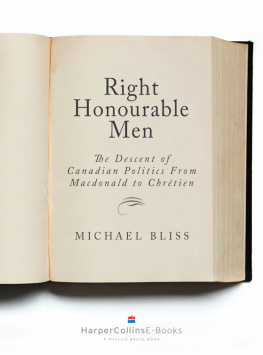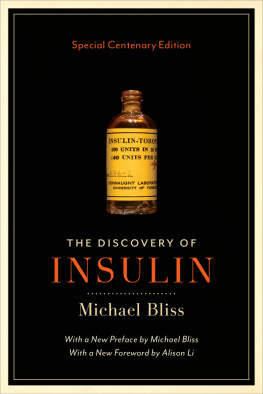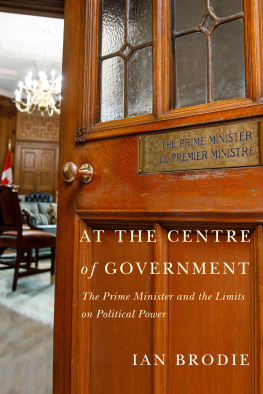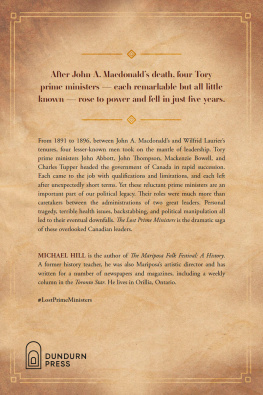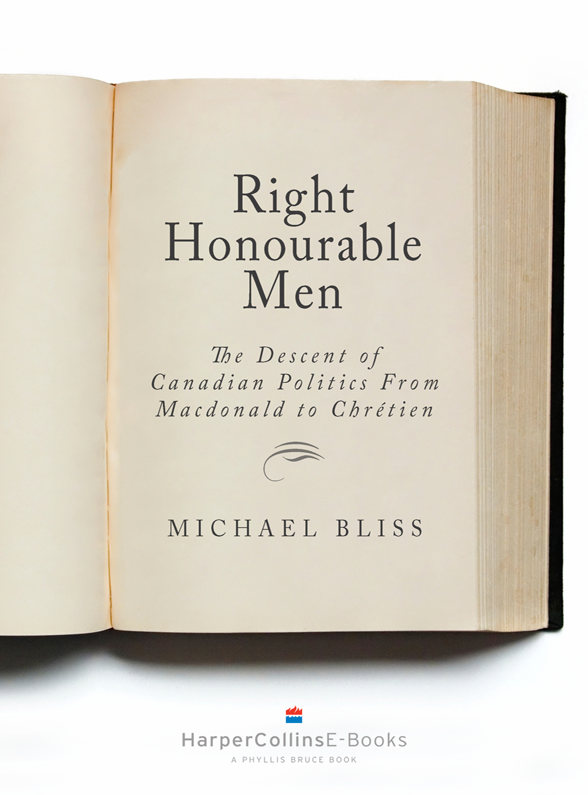To Jamie, Nicole,
Laura, Matt, Sally, and Andrew
Contents
Introduction
Prime Ministers, Power,
and the Democratic Deficit
T his is the second edition of an experiment in writing political history through biographical studies of Canadas most important prime ministers. The first version, published in 1994, concluded with Chapter Tens essay on Brian Mulroney followed by an epilogue on the collapse of the Progressive Conservative Party. In this edition the epilogue is replaced by Chapter Eleven, a study of Jean Chrtiens prime ministership. I also make minor alterations to several of the profiles and, in this new introduction, reflect on how ten years of Canadian history has affected my original conclusions. It has reinforced some of them and forced me to revise others.
The profiles are interpretative, analytical, sometimes anecdotal, and largely self-contained. You can dip into the book at the beginning, middle, or end, and you can ignore the rest of this introduction. But I use the careers of prime ministers as pegs on which to hang quite a bit of more general Canadian political history and a number of arguments about the thematic evolution of Canadian politics. I hope these chapters can be read profitably by everyone from secondary school students to political science graduates and that they will be read by all aspiring prime ministers.
Broad as I have tried to make it, my focus is necessarily limited. Many important themes and individuals are absent from these pages. Some readers will notice, for example, that the political left, as it presented itself through seventy years of the activities of the Co-operative Commonwealth Federation and New Democratic Party, hardly appears here. As Trudeau would say, tough. The CCF-NDP never attained power in national elections, and it seldom exercised the influence its adherents and court historians have claimed. Concepts of social justice and a welfare state for Canada, for example, were introduced to the national political agenda by Liberals, years before the birth of the CCF. The most important individual in creating the Canadian welfare state was not J.S. Woodsworth but the much-maligned Mackenzie King.
This is both history from the top down and a study of the great man in Canadian history (I neglect most of our failed, coffee-break PMs and a couple of the full-term second-rankers). Right Honourable Men is about the movement of history, politics, and power from the top down in society, as an elite-driven, deference-based British colonial system has matured into a sort of North American democracy. It is a study of how leadership has coped and failed to cope with the challenges posed by these and other developments.
While this is Canadian history from Parliament Hill, I am not a Hegelian and I do not believe that political leaders, least of all prime ministers of Canada, are personifications of the world spirit. Individuals do not change the course of history or move mountains with a snap of their fingers. Sometimes leaders are almost powerless against the tides of history. Other times, including perhaps the Chrtien years, they happily float with the tides, their only political principle being to take credit for the phases of the moon. Puzzling out exactly how and when and if specific prime ministers have actually changed Canadian history, have made Canada a different country, is one of the central tasks of these essays.
These chapters do not add up to a bottom line on governing Canada. There are no quick maxims, no easy recipes for what Brian Mulroney once called country running. It is absurd to believe that history or politics can be turned into a science. While broad historical patterns do recur, while some factors contribute to success or failure in almost every era, the river of history is constantly changing. Each generation faces new problems, calling for new responses. Every prime minister has been unique, hence the attraction and strength of a biographical approach. The two strongest prime ministers in Canadian history were Mackenzie King and Pierre Elliott Trudeau. What did they have in common? High intelligence, an abiding faith in popular sovereignty, and the integrated personalitys taste for solitude. But who can imagine Mackenzie King in buckskin, paddling his canoe through white water? Or Pierre Trudeau consulting a medium?
I subtitle these chapters the descent of Canadian politics for several reasons. This is a chronological presentation, organized around a descent through time, from the mid-nineteenth century to the beginning of the twenty-first. As mentioned, one of my main themes is the gradual descent of power in our monarchical/parliamentary system. Sir John A. Macdonald did not like or believe in democracy and his approach to government reflected his principles. But democracy in the form of universal suffrage gradually came to Canada, and has continued to evolve.
There was a profound descent of power from legislatures to the courts and to the people in the constitutional reform of 198182 and in the October 1992 national referendum on the Charlottetown Accord. In 1994 I thought this descent would continue to have important ramifications. It is now apparent, however, that in Jean Chrtiens Canada, the development of what has come to be called a democratic deficit blocked what I thought would be a continued devolution of power to Canadian citizens.
A more problematic connotion of descent is that of a decline in quality. Many, perhaps most, Canadians instinctively believe that has happened in our system of government. Where are the giants of old, the Macdonalds, Lauriers, Bordens, Trudeaus? Where are the leaders we yearn for in troubled times? Where are the visionaries? Why dont better men and women go into Parliament?
I have mixed feelings about such grumbling. Its true that neither Mulroney nor Chrtien stands highly in my prime ministerial rankings. Nor do I think that Joe Clark or John Turner or Kim Campbell or Stockwell Day had the capacity to do a significantly better job of governing Canada during the last two decades (Preston Manning will go down in history as the most interesting prime ministerial might-have-been from this era). It is certainly true, too, that Canadians have recently been more estranged from Parliament and the countrys national political elites. This is part of the concept of the democratic deficit. The leaders fell out of touch and we longed for better ones to govern us more wisely.
It does not necessarily follow that there has been a marked deterioration in the quality of men and women in politics. These pages say little about the evolving quality of Cabinet ministers or backbenchers, but my impression is that in recent years prime ministers have had better Cabinet material to work with, and better-educated, harder-working, more dedicated MPs to choose their Cabinets from, than Macdonald, Laurier, or Borden did. I think we are still attracting talented, idealistic Canadians into politics.
Many of them are frustrated, however, as are many Canadians, by the failure of our political system to enable them to maximize their talents in public service. Instead, the tight party discipline of Canadas unreformed parliamentary system of government forces members of parliament to surrender or prostitute their individualism while at the same time concentrating power too highly in the hands of prime ministers. In their wielding of power and their reluctance to share it John A. Macdonald and Brian Mulroney were kindred spirits, as were Wilfrid Laurier and Jean Chrtien. In fact, Mulroney and Chrtien could have served as excellent senior ministers in those long-ago administrations.

